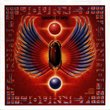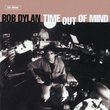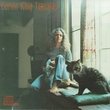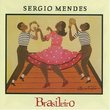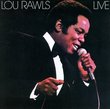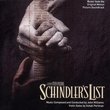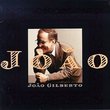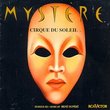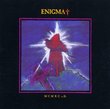| All Artists: Chick Corea Title: My Spanish Heart Members Wishing: 2 Total Copies: 0 Label: Polygram Records Original Release Date: 1/1/2000 Re-Release Date: 3/7/2000 Album Type: Original recording remastered Genres: Jazz, Pop Styles: Avant Garde & Free Jazz, Jazz Fusion, Modern Postbebop, Bebop Number of Discs: 1 SwapaCD Credits: 1 UPCs: 731454330329, 0731454330329 |
Search - Chick Corea :: My Spanish Heart
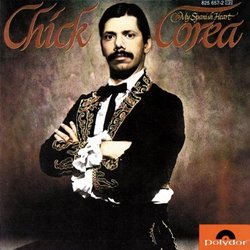 | Chick Corea My Spanish Heart Genres: Jazz, Pop
Pianist Chick Corea is best known for his fusion groups Return to Forever and Chick Corea's Elektrik Band, but his deep background is in the salsa he played with Mongo Santamaria in his introduction to the scene, and his i... more » |
Larger Image |
CD DetailsSynopsis
Amazon.com Pianist Chick Corea is best known for his fusion groups Return to Forever and Chick Corea's Elektrik Band, but his deep background is in the salsa he played with Mongo Santamaria in his introduction to the scene, and his interest in the lyrical melodic statements of Spanish-American music is obvious throughout his career. This ambitious program takes on a number of aspects of what Corea clearly sees as a key part of his cultural heritage. The 17-piece orchestra that provides the central context here is meant to be reminiscent of the Miles Davis/Gil Evans collaboration on Sketches of Spain and Charles Mingus's exploration of similar melodic themes on Tijuana Moods. --John Swenson Similarly Requested CDs
|
CD ReviewsMuch to Recommend It, But Some Reservations Karl Henning | Boston, MA | 11/01/2000 (4 out of 5 stars) "We love Spanish folk music, and the flamenco tradition particularly; I am not a great jazz fan per se, but I have seen Corea live and have witnessed the verve and heart he brings to various strands of jazz tradition. So, on balance, I came to this album prepared to like it. And to be sure there is a great deal to like; still, my ear has questions.I will have bad news and good news, and will get the bad out of the way. A lot of the synthesizer sounds are goofy, and sufficiently goofy to get in this listener's way, at any rate. Which strikes me all the more as a shame, considering what a great and rich sound the old grand piano has, and how impressive Corea's chops are. This is not a blanket criticism of synthesizers (little sympathy though I have with `em); some of the sounds on the album are all right, insofar as they dpn't get in the music's way. But there are tracks whose actual musical merits are badly compromised by ridiculous synthesized timbres - No one would have taken Winston Churchill seriously, if he had spoken in a Goofy voice.On a less dire note, Gayle Moran's vocalise is a little whooshy for my taste, although it works reasonably well for the few tracks on which she appears.But that is the worst of the news, and is more than balanced by this album's overwhelming strengths. Against the questionable decision reflected in some of the syntho-sound, you have the tasteful inclusion of three real-live trumpeters. No keyboard is any substitute for this archetype of Spanish sound.Corea's musical world is focused, vibrant, rhythmically and harmonically assured, and these characteristics are well represented on this album: "The Hilltop," Part III of "El Bozo" (which comes close to redeeming what are for me the album's most egregious electronic offenses), but most especially the four-part "Spanish Fantasy" which is the most accomplished and convincing musical statement I have heard Corea make, all the more vital for its giving itself into the stream of tradition.Corea's use of the string quartet is playful; "Day Danse" here recalls his use of the quartet with Al DiMeola on "Isfahan." (Indeed, "Night Streets" will be sonically familiar territory to anyone acquainted with "Splendido Motel.")There is plenty of music here which dances with a light heart and sure feet; plenty of impassioned elegance; plenty of affectionate references to various Spanish and Latin musical traditions. And these real strengths of the album carry it above the occasionally vexatious electronica." One of the finest albums ever MORTEN F ANDRESEN | Denmark | 04/24/2004 (5 out of 5 stars) "On this album, Chick Corea explores the world of spanish folk-music, without leaving his fine jazzfeelings behind. He accomplishes to make an album, that leaves you breathless, only wishing it would never stop. He proves his worth both as a pianist and a composer, as well as a bandleader. His timing and expression, combined with the worldclass rhythmsection, is a pure pleasure for the listener. Add the beautiful stringsection, the agressive horns, and, of course, Jean-Luc Pontys exclusive jazzviolin, and you have one of the best albums ever to be recorded. Pointing to the future, but still keeping an eye on the traditions, excellent!" A prime artifact of 70's fusion Allan K. Betz | Ogden Utah | 04/20/2005 (5 out of 5 stars) "Contrary to popular opinion I feel the 70's fusion movement was the last great blast of creative energy that blew through jazz before it sunk irretrievably into a tired old formula. There has been very little in this music beyond blowing an endless stream of hot licks over a (TWO FIVE ONE) chord progression. On this album Chick takes an interesting stacatto approach to the great MINIMOOG synth. His use of multitrack vocals, double tracked piano and string quartet are also innovative and unique. Contributions from Jean-Luc Ponty and Stanley Clark add greatly to the musical interest of this fine recording, a prime artifact of the last great era of jazz."
|

 Track Listings (18) - Disc #1
Track Listings (18) - Disc #1